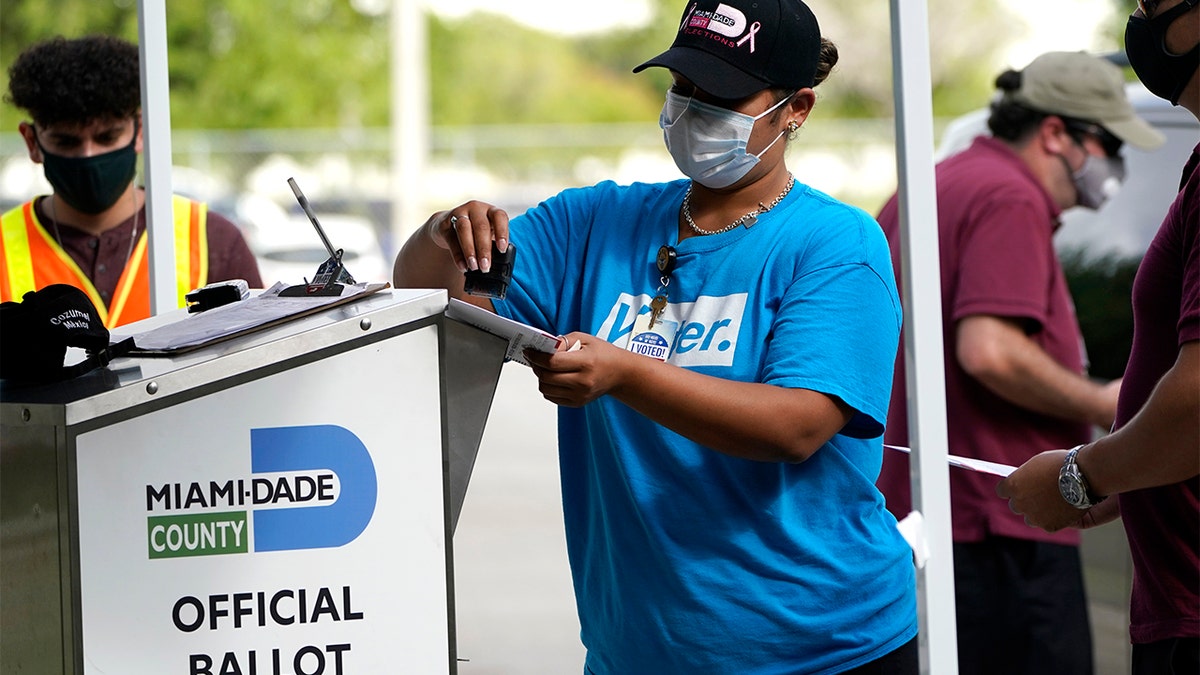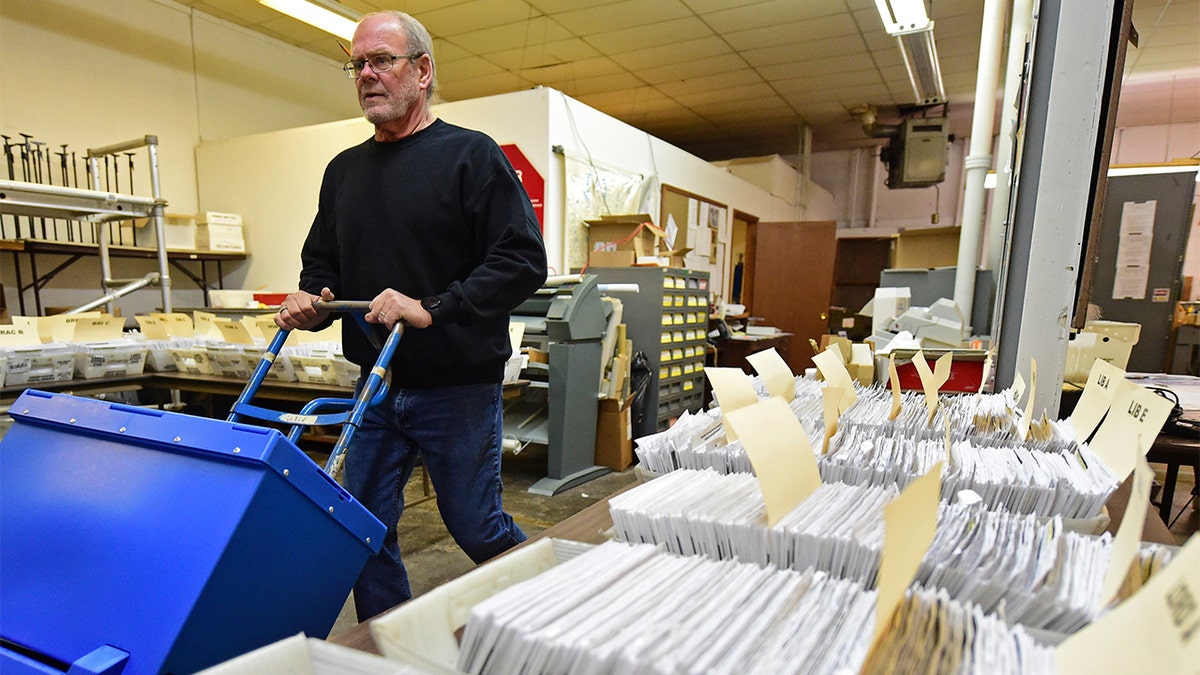Fox News Flash top headlines for April 22
Fox News Flash top headlines are here. Check out what's clicking on Foxnews.com.
Facebook founder Mark Zuckerberg and wife Priscilla Chan spent $350 million on election administration during 2020, prompting a growing number of state lawmakers across the United States to say "no, thanks" when it comes to accepting any private money to run future elections.
Arizona and Georgia enacted laws specifically banning election officials from accepting money from private entities for their jurisdictions, Arizona with a standalone bill, and Georgia in its sweeping election reform law.
Legislatures in Kansas and Idaho sent bills to prohibit private money for election administration to the desks of their respective governors, according to the Foundation for Government Accountability, a watchdog group that has tracked private financing of election administration. At least one legislative chamber in Arkansas, Wisconsin and Tennessee passed a similar measure.
"It’s the same reason why we have ethics rules on lobbyists gifts and limits on those things in states, or campaign finance rules and guardrails on those types of things," Nicholas Horton, research director for FGA told Fox News. "It just doesn’t pass the smell test. Government should be a neutral, fair arbiter of the election process, and the public should have no doubts and full confidence in that process when going to vote in the polls. When they are getting all this funding, there are just some bad potential outcomes that erode public confidence. I think that’s what’s really driving a lot of these states in really reining this in."
GOP SENATORS GRILL STACEY ABRAMS ON HER TRUE FEELINGS ON VOTER SECURITY MEASURES
Pennsylvania, North Carolina, Texas and Florida are among other states with pending measures before the state legislature to block private funding of elections.

In this Oct. 26, 2020 file photo, an election worker stamps a vote-by-mail ballot dropped off by a voter before placing it in an official ballot drop box before at the Miami-Dade County Board of Elections in Doral, Florida. (AP Photo/Lynne Sladky)
Zuckerberg and Chan contributed $350 million to the Center for Tech and Civic Life in 2020 that distributed it to 49 states across 2,500 jurisdictions for election administration to pay for additional polling places, ballot drop boxes, "voter education" and other matters amid the COVID-19 pandemic. Conservatives have contended the money primarily went to heavily Democratic areas in battleground states in an effort to tilt the balance.
States should note that private funding for public matters is not unusual, said Tiana Epps-Johnson, executive director of the Center For Tech and Civic Life.
"Private funding is used to supplement a variety of government services where there are funding shortfalls, including schools and libraries," Epps-Johnson told Fox News in a statement. "We hope that as states consider the issue of private funding, they solve the real long-standing problem, which is making sure that election departments are fully funded so they are able to deliver a professional, inclusive, secure voting process for all of their voters."
WARNOCK ADMITS TO SIGNING EMAIL WITH FALSE INFORMATION ABOUT GEORGIA VOTING LAW
The Foundation for Government Accountability has researched how the money was used in several states – some that played pivotal roles in the 2020 election outcome between Joe Biden and Donald Trump – with very little going to pay for personal protective equipment.
In Arizona, which got $6 million from the group, in the four of the five counties President Biden carried that got the CTCL money, Democratic voter participation increased by at least 36% from 2016, according to an FGA report. The state's largest county, Maricopa, had a 48% Democratic increase from four years earlier.
When signing the law, the Arizona bill, Gov. Doug Ducey was clear the state was grateful for the funding in an emergency year.
"Nothing in this law should be interpreted as being unappreciative," Ducey reportedly wrote. "Going forward, the legislative and executive branches must continue to invest adequate resources to ensure you and county election officials have the resources you need to effectively and securely administer elections."
A separate report by the foundation on Pennsylvania – which got $20 million for 23 election jurisdictions – found that Biden-carried jurisdictions got an average of $4.99 per registered voter compared to $1.12 per registered voter in Trump-carried counties. The research also found Democratic-leaning counties received 92 percent of the total amount spent in Pennsylvania.
FACEBOOK BLASTED FOR CENSORING REPORT ON BLM CO-FOUNDER'S PRICEY REAL ESTATE: 'IT IS CHILLING'
While the bulk of the money to the Center for Tech and Civic Life came from Zuckerberg and Chan, other major donors have included the mostly left-of-center organizations such as the Democracy Fund, the John S. and James L. Knight Foundation, and the Rockefeller Brothers Foundation, according to the Capital Research Center.

This Tuesday, Nov. 3, 2020 file photo shows Board of Elections worker Bob Moody moving boxes of ballots at the Trumbull County Board of Elections in Warren, Ohio. (AP Photo/David Dermer)
With the Epps-Johnson statement, the CTCL sent an additional statement attesting the fairness of the grants.
"CTCL is a non-partisan organization backed by Republicans, Democrats, and nonpartisan officials. Last year, with generous private funding, CTCL announced the COVID-19 Response grant program," the statement said. "All local election offices responsible for administering election activities covered by the CTCL COVID-19 Response grant program were eligible to apply for grant funds. In Texas, for example, the facts were clear. 117 election departments across the state of Texas have requested and received CTCL COVID-19 Response Grants, including 98 in jurisdictions that voted for Donald Trump in 2016. Over half of all grants nationwide went to election departments that serve fewer than 25,000 registered voters."
However, that $5-$1 ratio per registered voter found in Pennsylvania was generally consistent in other states, Horton argued. Because large cities are more densely populated than rural areas, the foundation did a per-voter analysis rather than a per-jurisdiction analysis. This, he said, doesn’t indicate the money was merely scaled to population.
"A lot of the red counties, a lot of the Trump jurisdictions, particularly in the rural areas, got the minimum," Horton said. "They got $5,000. But if you’re a blue jurisdiction, we’re going to give you $10 million or $12 million or $15 million. Maybe they can truthfully and technically say they gave it to everyone that asked. The question is how much did they give? Where did they direct the majority of those funds?"
The center has roots with the Democratic Party. In 2012, Epps-Johnson, Donny Bridges and Whitney May founded the CTCL. The three previously worked together at the New Organizing Institute, which The Washington Post referred to as "the Democratic Party’s Hogwarts of digital wizardry." Epps-Johnson is a former Obama Foundation fellow.
"They label themselves as nonpartisan, but if you look at who is working for them, including quite a few old Obama staffers, it’s a partisan organization, left-leaning progressive," Madeline Malisa, a senior fellow at the Foundation for Government Accountability who has testified in favor of laws restricting private money before state legislative committees, told Fox News.
"A private third party should not be making decisions on which jurisdictions should get money and how much they get," Malisa added. "We’ve heard from some Democratic legislators that elections are generally underfunded. Our point to that is that is a legislative decision and should not be a decision of third parties."
CLICK HERE TO GET THE FOX NEWS APP
Neither the Facebook press office nor a spokesperson for the Chan Zuckerberg family office responded to inquiries from Fox News for this story. But Zuckerberg posted his view about the matter on Facebook in October, weeks ahead of the election.
"These funds will serve communities throughout the country – urban, rural and suburban – and are being allocated by non-partisan organizations," Zuckerberg wrote. "The Center for Tech and Civic Life shared data on the grant applications so far that shows that while a number of large jurisdictions have applied, the majority of applications have come from jurisdictions with fewer than 25,000 registered voters. All qualified jurisdictions that apply for the funds will be approved."












































